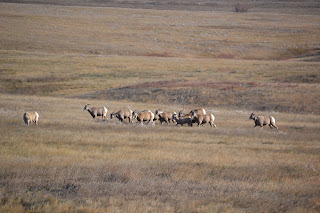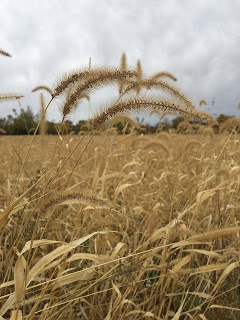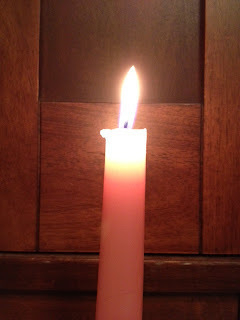Advent
- fasts with feasts,
- days of rest with days of labor,
- celebration with food,
- the progress of our days with the progress of the skies,
- remembrance with anticipation,
- rejoicing with mourning.
Commerce, Environmental Attention, and the Liturgical Calendar
 |
| Bighorn sheep in the Badlands National Park. The animals move together, responding to the land. |
By "liturgy" I mean the work we do together on a regular basis. The word "liturgy" comes from two Greek words that mean "the work of the people," and it usually refers to the rituals of worship in a religious congregation: it's the formula for when and how and where we stand, sit, kneel, pray, etc.
Most religions I can think of have liturgical calendars that describe the regular cycle of rituals in a year. If liturgy usually refers to what we do when we gather for a holiday or a day of worship, a liturgical calendar organizes the year so that we know when those days occur. It usually gives a sense of the flow of time, connecting days to one another with some purpose: liturgical calendars connect
 |
| Watching the seasons change: autumn leaves make imprints in the ice on my campus green. |
I used to think this was all silly, and a forced imposition on my freedom.
Lately I've been discovering that -- for me, at least -- the calendar's structure is a source of freedom from other calendars that don't help me to live well.
When I was younger I abandoned the liturgical calendar because I didn't want someone else telling me what days were holy. Why shouldn't they all be holy if I want them to be? And why should I fast just because someone else said we all should fast?
What I've come to see lately is that If we abandon the liturgical calendar with its times of feasting and fasting, the calendar doesn’t go away; it just becomes commercialized and turned into a calendar of constant consumption, constant labor. Feasting becomes purchasing; fasting becomes debt; and the two coincide with no time of rest between.
I experience the collapse of the calendar most where people like me have given it up and allowed others to co-opt it for commercial purposes. In simple terms, I experience it when I walk into a store in October and I hear Christmas music. All around me are ads telling me that my greatest obligation is to purchase things for Christmas, and to do so now.
This makes me want to shout: please spare me the Christmasy jingles, most of which drive me from your store. I like Christmas hymns, but the stress of being a cog in the machinery of holiday commerce has led me to appreciate the difference between Advent (a season of anticipation, of watching, and waiting) and Epiphany (a season of revealing, of celebration of birth, of discovery).
No one taught me this when I was young, but I've learned over the years that my tradition has different hymns for different times in the liturgical calendar. Now it feels odd to enter a pharmacy and to hear a hymn for the Nativity being played over the loudspeakers during Ordinary Time.
I used to think all that tradition to be nonsense. The older I get, the more I appreciate the thoughtful progress of a year, and the more I dislike the flattening of all days and all times into a yearlong, nonstop worship of commerce and toil.
We can't easily escape liturgical calendars, and I'm not sure we should. Even the birds of the air know when it is time to migrate, and they all have their liturgy of flight. The flowers know when to bloom, the salmon know when to spawn, the bears know when to look for the salmon. We humans used to know all these things, too.
Little by little we have lost connection to the liturgies that connect us to the land, the plants, the animals, the water, the wind, and the skies. When I ask my students what the phase of the moon is, it's rare that they know.
And I admit it is a wonderful thing not to need the moonlight. Running water, grocery stores, central heating, a solid roof, a functioning car, and many other modern conveniences are delightful. But they do come with costs; these good things are not free. They cost us money, which means we work more for them. And they have invisible costs, like the slow change of the quality of air in cities, the slow degradation of the planet's water, the slow loss of species around the world, the slow accumulation of things we throw away.
And then, when these slow processes pile up, we begin to notice them, and we begin to wonder: what have we done? We slowly gave up the liturgies of seedtime and harvest and replaced them with liturgical calendars in which all days are days of commerce and toil.
Which gives rise to new liturgies, urgent liturgies of anxiety. Look at what we have done, we say. With sackcloth and ashes we lament the fouling of our nest. As an environmental researcher, I see the fouling clearly and often, and I share that stress, that anxiety, that lamentation.
But if we replace the new liturgy of constant toil and waste with a newer one of constant lamentation over the toil and waste, we might wind up replacing one flattening of days with another.
 |
| Seedtime leads to harvest, and then seedtime again, with times of rest in between. |
I don't know the solution, and I don't intend to argue for returning to some halcyon past. Nor do I plan to argue for the imposition of my chosen calendar on others. But I do intend to reexamine the calendar I inherited, to dust it off and see what I missed when I put it aside. Sometimes old ideas are still good ones; some old seeds can still bear new fruit.
For now, what I propose is to mourn in some seasons, but also to rejoice in others. If there is mourning to do, it is also the case that there is still life to preserve. Each of these things--mourning and preserving, looking back at what is lost and looking ahead to what might flourish--calls for its own day. And each day calls for a calendar that can connect it to the other days in a way that keeps each day from dissolving into atomic time. Each day has some part of the whole of life. That part is worth seeing in its own day.
Of Men and of Angels
That's from one of St. Paul's letters to the church in Corinth. It's a passage often read at weddings, probably because it speaks eloquently about agapic love.
I like it for another reason: it has a nice onomatopoeic pun in the Greek text. Paul's "If I speak..." is lalo; his "clanging" is alaladzon, which sounds like the noise a gong makes and sounds like it could mean "un-speaking." (In Greek, words that begin with "a-" are often like English words beginning with "un-".)
This week, as we approach the third Sunday in Advent, I was looking again at a poem I wrote during this week a few years ago, after the school shooting in Newtown. In it I compared first responders and teachers and others who give up so much for the sake of the common good to angels. That is my second-most read post ever.
The most-read post is one I wrote after Ferguson, about the militarization of our first responders, and the way the tools we equip ourselves with change the way we interact with the world - and with other people.
Both of these posts are about public servants. Taken together they remind me that what is done in love can be heroic and life-giving, and what is done in fear can become tyrannical. They remind me that we have a tendency to revere the outward signs of badges and uniforms, when we should judge characters by the habits they embody and by the actions that show the habits.
And they remind me that we have a long, long way to go before we can say we have learned to love one another.
*****
I should add that even the title to this post is misleading. The word Paul uses is not "men" but "humans." I like the cadence of the old translation "men" but the word is anthropon, not andron. Normally I prefer the more inclusive (and more accurate) "humans" but I first learned this verse in an older, poetic translation and the rhythm of it has stuck with me.
A Poem As I Approach Gaudete Sunday
Advent

No Room In The South Dakota Inn? An unjust and ironic law.
Manny Steele and two other SD legislators are apparently proposing that we criminalize hospitality. Their proposed law would make it illegal to offer a ride or lodging to illegal immigrants, and it would also make it a crime for an illegal immigrant to ask for work.
Putting aside the fact that this would be a very difficult law to obey and to enforce (Would bus drivers and cab drivers need to verify citizenship before taking on fares? Would it be illegal to offer a ride to a stranger? Would shelters be forced to turn aside illegal immigrants on freezing nights?) this is ironic news to appear on the first Sunday of Advent, the season in which we prepare to celebrate the birth of Jesus. This is the Jesus who was born to poor immigrants who had no place to live in their hometown. Who was born in a barn. Whose parents were forced to flee their homeland to escape politically motivated violence.
I propose that our legislators take some time this Advent to try to put themselves in the shoes of other poor migrants. Think about it: if you lived in Mexico, would you willingly give up that climate for South Dakota winters if you could avoid it? Would you give up your hometown, your family, your language, your familiar food - in short, everything - to come to South Dakota if you could avoid it?
More to the point: Would you make Mary give birth in your barn or your garage? I understand why you’re concerned about jobs and about enforcing our laws. We have a great country, and we should work to keep it great. But we will not make our country greater by making our hearts harder.
Meanwhile, as for me and my family, we would rather stand with Mary and Joseph. And we will continue to say, as Christians and Jews have said for millennia, that an unjust law is no law at all.
María y José, bienvenidos en nuestro pueblo.
Come Along, Inspector Jesus?
When my youngest son was still quite small, he loved the Advent hymn, “Come Thou Long Expected Jesus.” We think he loved it in part because he loved the movie “Inspector Gadget,” and he thought the words were “Come Along, Inspector Jesus.” (We had several such mis-hearings of hymns, it turns out. Another favorite was the second line of “Jesus, Lover of My Soul,” which my son heard not as “Let me to thy bosom fly” but “Let me chew thy apple pie.” I think of apple pie as a gift from God, so I have no problem with this.)
I’m not sure why, but this year I’ve been more conscious than ever of Advent. It seems that everywhere I go I hear Christmas music during Advent, which has been striking me like Christmas carols on the fourth of July - a confusion of holidays. Liturgical calendars have left a shadow-impression of themselves on cultural calendars, but much of their detail has been lost. Who celebrates Pentecost, for instance? Yet it used to be one of the most important of Christian holidays. Christmas and Easter are great gift-giving holidays, but Lent’s main appearance seems to be in Mardi Gras.
I don’t plan to be a curmudgeon about this, and lament that we’ve lost the “good old days” of piety and that today’s culture is somehow more degenerate than yesterday’s. I’m quite fond of today, actually. (It’s where I live, after all!) I don’t dislike being wished a “Merry Christmas” in Advent any more than I disliked hearing my son sing “Come along, Inspector Jesus!” (And no, I don’t mind being wished “Happy Holidays” either. Anyone who wants to wish me well on any given day is always welcome to do so!)
But I do think that it’s worth revisiting old ideas to see if we’ve “mis-heard” them. For myself, it has been a delight to be in Advent this year. When I’ve heard Christmas carols (as early as November!) I’ve tried to think of Advent hymns instead. The result has been that I’ve been nurturing the pleasure of expectation and anticipation, and, now that Christmas is upon us, singing those Christmas hymns is going to be a real treat.
However you celebrate these days, whether you distinguish Advent from Christmas and Epiphany, or celebrate Christmas from Hallowe’en to Mardi Gras, or if you just finished celebrating Hanukkah, or are enjoying some other holiday, I wish you all the best that holiday has to offer. And if you celebrate no holy-days, but are only having some time off, I wish you good rest in that. And for all of us, I wish us good hearing, joy in mis-hearings, and better ears to hear in the future.